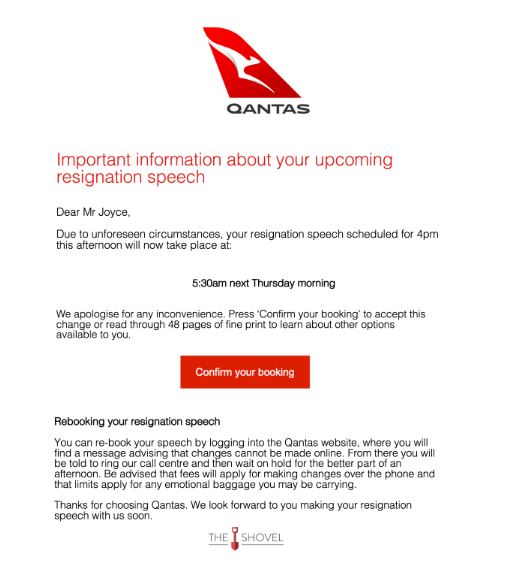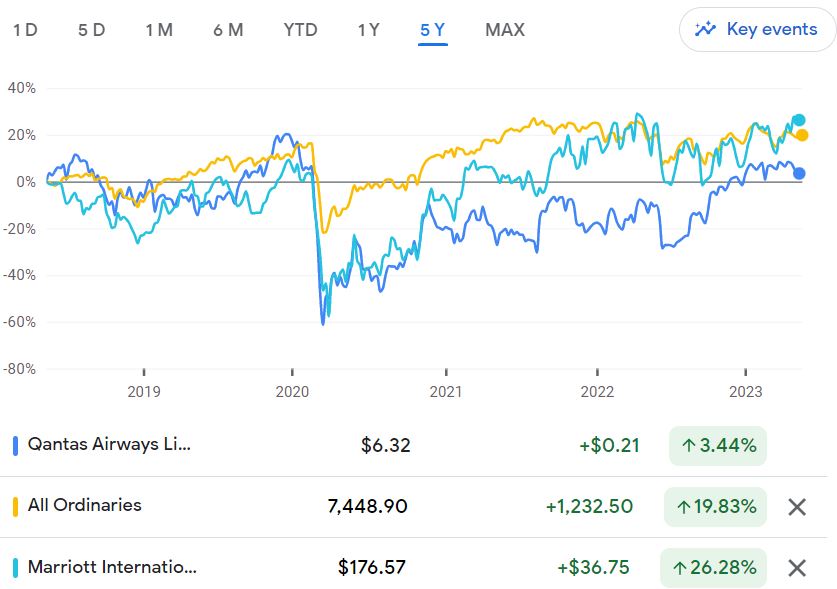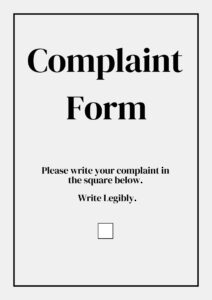5 ways to deal with Complaints
written by Maree Stuart
Oh Alan, I would give everything, not to be like him.
Would you want to be Alan Joyce right now? He’s the butt of many jokes, including this one from The Shovel:

With QANTAS seen to be the stand-out performer in poor customer service and failures to respond to customer complaints, it’s not been able to recover from the drop in its share price following the COVID-19 pandemic halt to travel. Compare it to the share price for the Marriot Hotels Group and the All Ordinaries. All took a hit, but QANTAS has taken a lot longer to get back to its starting place pre-pandemic.

Some of this is a result of a set of circumstances in the supply chain which are to an extent outside of the control of any one company. And, yes, there are staff shortages. But the thing that is really affecting the bottom line is customers leaving in droves because they have not been listened to. So now they have an incoming CEO who states her priorities are Customers, then Staff, then Shareholders.
What’s that got to do with me?
You might be asking yourself this very question.
Well, this is a very sorry tale of the effect of poor customer service and failure to deal with complaints. It has a real impact not only on your customer but other stakeholders. Would you want to be a staff member on the end of an increasingly frustrated and angry customer who has spent several hours over many days in an effort to simply get their connecting flight between Sydney and Japan booked when QANTAS changed the first leg of the journey without considering its impact? (My husband has the patience of a saint!)
Don’t let this happen to your lab!
There is a way out of this!
If only Mr Joyce had have looked beyond the end of his nose!
Cleverly disguised in ISO management system standards, such as ISO/IEC 17025 and ISO 15189, is an internationally recognized framework for the proper handling of complaints from customers, stakeholders, and other interested parties.
Effectively addressing complaints is essential for laboratories to maintain credibility, improve customer satisfaction, and enhance their overall service quality. Proper complaint handling allows laboratories to identify areas of improvement, address issues promptly, and demonstrate their commitment to customer satisfaction and continuous improvement.
A recap on the requirements
Section 7.9 of the ISO/IEC 17025:2017 standard outlines the general requirements for handling complaints. This essentially boils down to some basic elements.
- Establish a complaint handling process. Labs need to develop a documented process for receiving, evaluating, and resolving complaints from customers, stakeholders, and other interested parties.
- Make information available on the complaint handling process to any interested party on request.
- Have people independent of the activity which is the subject of the complaint, make decisions on the investigation outcomes and actions.
- Investigate complaints, including identifying the root cause, implementing corrective actions, and, where necessary, preventive actions to prevent the recurrence of similar issues.
- Maintain records of complaints. Laboratories need to maintain records of all complaints received, the actions taken to address them, and the final outcome. These records must be retained for a specified period and be accessible for review and monitoring.
- Communicate with complainants. Laboratories must acknowledge receipt of complaints promptly and communicate with the complainant throughout the complaint handling process, including providing updates on the progress and resolution of the complaint.
 Strategies for Effective Complaint Handling
Strategies for Effective Complaint Handling
The strategies for managing complaints can keep your lab from suffering from customers leaving and a downturn in value. It all starts with being customer-centric, with you and your staff putting themselves in the shoes of the customer.
Here’s 5 strategies that can help.
- Foster a customer-centric culture. Encourage a culture that prioritises customer satisfaction and promotes open communication between your staff and customers. This includes ensuring that staff understand the value of customer feedback and the importance of addressing complaints promptly and effectively.
- Develop a comprehensive complaint-handling policy and process. Establish a written policy that outlines your lab’s commitment to addressing complaints, the procedures for handling complaints, and the responsibilities of people involved in the process.
- Provide training on complaint handling. Equip your staff with the skills they need for managing any feedback, both negative and positive. Ensure they receive regular training on the importance of effective complaint handling, the lab’s policies and procedures, and best practices for managing complaints. This training should be documented and monitored for effectiveness.
- Establish clear communication channels Laboratories should provide clear and accessible channels for customers, stakeholders, and other interested parties to submit complaints, such as dedicated email addresses, telephone numbers, or online forms.
- Monitor and analyse complaint data. It’s important to regularly analyse complaint data to identify trends, patterns, and areas for improvement. That’s why it’s a required input of management review. This information can be used to inform corrective and preventive actions and drive continuous improvement efforts.
Learn from the mistakes of QANTAS! Handling complaints effectively is a critical aspect of an organisation’s performance.
To have success, labs need to demonstrate their commitment to addressing customer concerns through a robust and transparent complaint-handling process. By understanding the requirements for handling complaints, implementing effective policies and procedures, and fostering a customer-centric culture, your lab can maintain the trust of your clients and stakeholders, and continually enhance the quality of your services.
And remember, you don’t have to do this alone!
If you’re having problems with properly dealing with complaints and need a complaint whisperer, we’re just an email or phone call away. Get in touch at maree@masmanagementsystems.com.au, or call on 0411 540 709.
People who enjoyed this article also read:


 Strategies for Effective Complaint Handling
Strategies for Effective Complaint Handling

